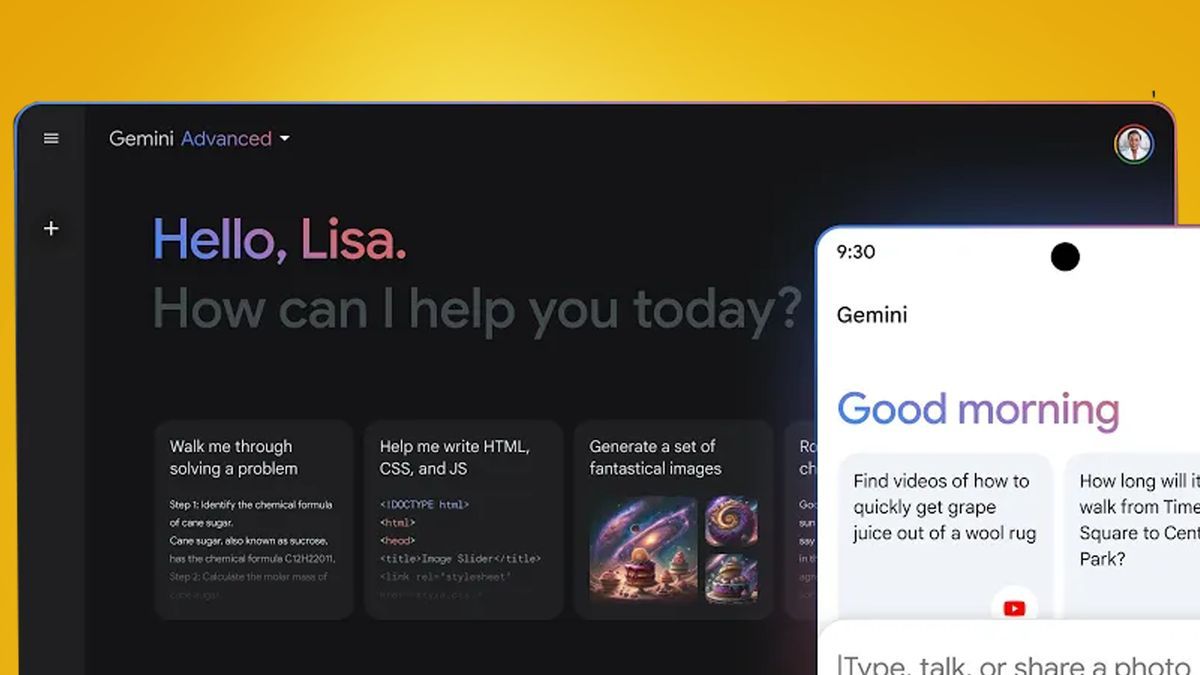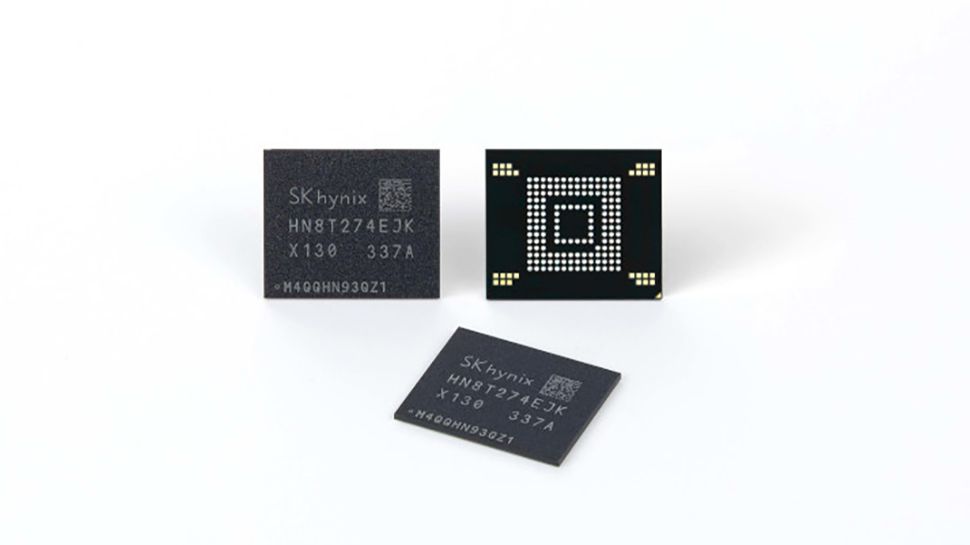Google has been a sleeping AI giant, but this week it finally woke up. Google Gemini is here and it's the tech giant's most powerful range of AI tools yet. But Gemini is also, in true Google fashion, very confusing, so we're here to break it all down quickly.
Gemini is the new umbrella name for all of Google's AI tools, from chatbots to voice assistants to full-fledged coding assistants. It replaces both Google Bard, the previous name of Google's AI chatbot, and Duet AI, the name of Google's Workspace-oriented rival, CoPilot Pro and ChatGPT Plus.
But this is also much more than a simple rebrand. As part of the launch, Google has released a new free Google Gemini app for Android (in the US, for now). For the first time, Google is also launching its most powerful large language model (LLM) yet called Gemini Ultra 1.0. You can play with that now, too, if you sign up for their new Google One AI Premium subscription (more on that below).
This is all pretty confusing stuff and we haven't even scratched the surface of what can actually be done with these AI tools yet. So for a quick load to keep you up to date with all things Google Gemini, tune in to our easy-to-digest explainer below…
1. Gemini replaces Google Bard and Duet AI
In some ways, Google Gemini simplifies things. It's the new umbrella name for all of Google's AI tools, whether you're on a smartphone or desktop, or using the free or paid versions.
Gemini replaces Google Bard (the previous name of Google's “experimental” AI chatbot) and Duet AI, the collection of work-oriented tools for Google Workspace. Looking for free AI help to create images or rewrite emails? Now you can go to Google Gemini and start using it with a standard Google account.
But if you want the most powerful Gemini advanced AI tools and access to Google's newest Gemini Ultra LLM, you'll need to pay a monthly subscription. This is part of the Google One AI premium plan, which you can read more about below.
In summary, there are three main ways to access Google Gemini:
2. Gemini also replaces Google Assistant
As we mentioned earlier, Google has released a new free Gemini app for Android. This is rolling out now in the US, and Google says it will be “fully available in the coming weeks,” with more locations “coming soon.” Google is known for having a broad definition of “soon,” so the UK and EU may need to be patient.
There will be a similar release for iOS and iPhone, but with a different focus. Instead of a standalone app, Gemini will be available in the Google app.
The Android app is very important in particular because it will allow you to set Gemini as your default voice assistant, replacing the existing Google Assistant. You can set this up during the app setup process, where you can tap “I agree” to have Gemini “handle tasks on your phone.”
Do this and it will mean that every time you call a voice assistant on your Android phone, whether by long-pressing the home button or saying “Hey Google”, you'll talk to Gemini instead of Google Assistant. That said, there is evidence that you may not want to do it just yet…
3. You may want to stick with Google Assistant (for now)

The Google Gemini app has only been available for a few days, and there are early signs of teething problems and limitations when it comes to using Gemini as a voice assistant.
The Play Store is filling up with complaints claiming that Gemini asks you to tap “send” even when using voice commands and that it lacks functionality compared to Assistant, including not being able to handle hands-free reminders, home device control, and further. We also encountered some bugs during our first tests with the app.
Fortunately, you can go back to the old Google Assistant. To do so, simply go to the Gemini app, tap your Profile in the top right corner, then go to Settings > Google Digital Assistants. Here you can choose between Gemini and Google Assistant.
Sissie Hsiao (Google vice president and general manager of Gemini experiences) says that Gemini is “an important first step in building a true AI assistant, one that is conversational, multimodal and useful.” But right now, it seems like the “first step” is taking a lot of hard work.
4. Gemini is a new way to evaluate other Google apps

Like the now-retired Bard, Gemini is designed to be a sort of creative co-pilot if you need help with “writing, brainstorming, learning, and more,” as Google describes it. So, as before, you can ask him to tell you a joke, rewrite an email, help you with research, and more.
As always, the usual warnings remain. Google is still quite clear that “Gemini will make mistakes” and that, although it improves every day, Gemini “may provide inaccurate information, or may even make offensive statements.”
This means that your other use case is potentially more interesting. Gemini is also a new way to interact with other Google services such as YouTube, Google Maps and Gmail. Ask it to “suggest some popular tourist sites in Seattle” and it will show them on Google Maps.
Another example is asking you to “find videos on how to quickly get grape juice out of a wool rug.” This means that Gemini is effectively a more conversational way to interact with YouTube and Google Drive. He can now also generate images, which was a skill Bard learned last week before his name was changed.
5. The free version of Gemini has limitations

The free version of Gemini (accessed through the Google Gemini app on Android, in the Google app on iOS, or on the Gemini website) has quite a few limitations compared to the subscription-only Gemini Advanced.
This is partly because it is based on a simpler large language model (LLM) called Gemini Pro, rather than Google's new Gemini Ultra 1.0. Generally speaking, the free version is less creative, less accurate, unable to handle multi-step questions, can't really code, and has more limited data handling powers.
This means that the free version is better for basic things like answering simple questions, summarizing emails, creating images, and (as we discussed above) testing other Google services using natural language.
Are you looking for an AI assistant that can help you with advanced coding, complex creative projects, and also works directly in Gmail and Google Docs? Google Gemini Advanced might be a better fit for you, especially if you're already a Google One subscriber…
6. Gemini Advanced is tempting for Google One users
Subscription-only Gemini Advanced costs $19.99 / £18.99 / AU$32.99 per month, although you can currently get a two-month free trial. Confusingly, you get Advanced by paying for a new Google One AI Premium Plan, which includes 2TB of cloud storage.
This means Gemini Advanced is particularly tempting if you already pay for a Google One cloud storage plan (or want to sign up anyway). With a 2TB Google One plan already costing $9.99 / £7.99 / AU$12.49 per month, that means the AI features are effectively costing you $10 / £11 / AU$20 additional per month.
There's even better news for those who already have a Google One subscription with 5TB of storage or more. Google says you can “enjoy AI Premium features until July 21, 2024, at no additional charge.”
This means that Google, in a similar style to Amazon Prime, is combining its subscription offerings (cloud storage and its most powerful AI assistant) to make them more attractive (and, most likely, more sticky too).
7. The Gemini app might take a while to arrive in the UK and EU

While Google has stated that the Gemini app for Android is “coming soon” to “more countries and languages,” it hasn't given any timeline for when that will happen, and one possible reason for the delay is that it's waiting for the EU. The AI Law will be clearer.
Sissie Hsiao (Google vice president and general manager of Gemini experiences) told MIT Technology Review that “we are working with local regulators to make sure we meet the requirements of the local regime before we can expand.”
While that sounds a little ominous, Hsiao added that “rest assured, we are absolutely working on it and I hope we can announce the expansion very, very soon.” So if you're in the UK or EU, you'll have to settle for experimenting with the website version for now.
Given early reviews of the Google Gemini app for Android and its inconsistencies as a Google Assistant replacement, that might be for the best anyway.









